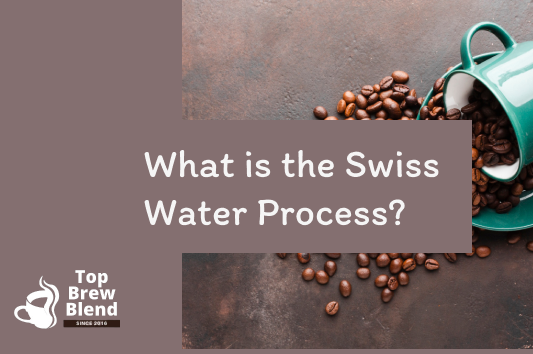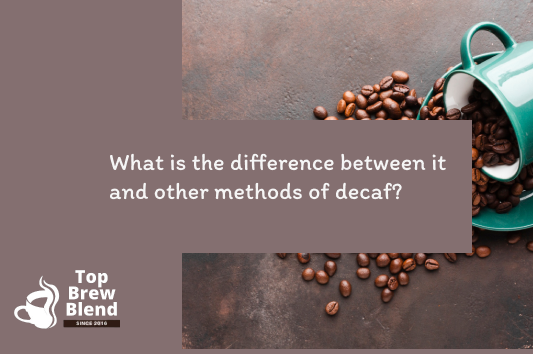What is the Swiss Water Process?
The Swiss Water Process is a patent-pending method of decaffeination that makes use of water alone to eliminate 99.9 percent of a coffee’s caffeine amount. The process also employs heat and time. employed, but water that is clean is the only ingredient that’s added.

How can you get rid of caffeine with water and only drinking it?
It’s a bit complicated however the simplest answer is the process of diffusion. Swiss Water explain that the green coffee is coated with their own Green Coffee Extract (“GCE”) which contains every water-soluble compound that are found in coffee, with the exception caffeine. It is then heated to make the coffee beans expand and they become porous. The caffeine molecules are released from the swelled coffee and into GCE via osmosis. those volatile substances that impact things such as flavor and the aroma remain in the coffee. This process is repeated till the cup is 99.9 percent caffeine-free.
What is the difference between it and other methods of decaf?

Swiss Water is a method of decaffeination that does not use any chemicals. Swiss Water method uses no chemicals at all, in contrast to other methods of decaffeination use of chemical solvents, such as the methylene chloride (“MC” decaf) and the ethyl acetate (“EA” decaf ) which can be synthetically or naturally derived).
Do decaffeination techniques that are chemically based harmful to your overall health?
There’s a bit of debate on this issue, but we’ll leave the decision to you. Although there are definitely some trace amounts of methylene chloride that are present on both green as well as the roasted “MC” decaf, research from recent times has shown that these levels are smaller than EPA limits. The ethyl acetate brand is often marketed as as a “natural process” alternative. But, it’s dangerous to consume ethyl Acetate in large quantities, regardless of whether it’s synthetically or naturally derived. However the trace amounts that are present in coffee are below the limit set in the EPA.
Examining various cups of coffee by cup testing and examining the physical quality of the coffee beans.
Are Swiss Water process decafs taste similar to the coffee that is not decaf?
Decaffeination is the process of hydrating and drying coffee, which means that no method is invincible to variations in taste. However, compared to other methods of decaf we’ve tested and tried, this Swiss Water method is the most transparent method of giving flavor to the cup’s profile. Send in a coffee that is fruity and you’ll receive a fruity decaf as a reward. MC and EA decaf varieties can taste excellent, but we believe that it is the Swiss Process decaf method has the least impact on the original flavor.
What happens to the water utilized for this type of decaffeination?
The majority of the water used in Swiss Water Process Decaffeination, 85% of it is returned back to its source in clean community water. The remaining 15% is consumed during the process.
How does the caffeine behave when it’s gone?
After decaffeination The GCE which contains the caffeine that was removed from the green coffee, goes through an array of charcoal filters that trap the caffeine completely, and the water that is clean is then available for reuse.
How does Swiss Water process decafs roast in comparison with other types of decafs?
It is believed that Swiss Water process coffees are lighter brown than the ones processed with MC or EA methods, which makes it easier to assess the degree of roast by appearance. The process of eliminating caffeine could affect the cellulose structure of the beans expands with hot water in decaffeination. This could result in more pliable, less audible first and second cracks. Also, it means that the oil will likely get to the top of the bean within a couple of days following roasting.
.
How long will the decaf coffee beans last?
Comparatively to non-decaf Decaffeinated coffees tend to have a shorter shelf-life due to the physical change I have mentioned earlier and also increased levels of water activity, which is a result of expanding the beans using water. The Swiss Water team Swiss Water have refined their procedure to ensure that the water activity is constant and can greatly extend the shelf life of coffees as time passes.
I have tried the Swiss Water process a long time ago. Is it different now?
The water and other ingredients that are used using the heat and time, haven’t changed much. But, the Swiss Water team of coffee experts and researchers continue to test and refine their decaffeination process to ensure an outcome that is the least detrimental on the flavor. We’ve definitely experienced a significant improvement over the past 10+ years we’ve been an Swiss Process customer!
What else do I need to be aware of concerning Swiss Water?
Swiss Water’s Swiss Water team is made consisting of coffee tasters baristas, roasters, Q graders as well as engineers, scientists and researchers with years of experience in their areas. They scrutinize every coffee that is brought into their facility to ensure they’re a perfect match for decaf. They sample the coffee before and after processing to ensure the quality of the coffee is at par. They are constantly seeking ways to improve their water purification process. This is why they’re acknowledged as an industry innovator who can produce many among the best tasting decafs on market.

